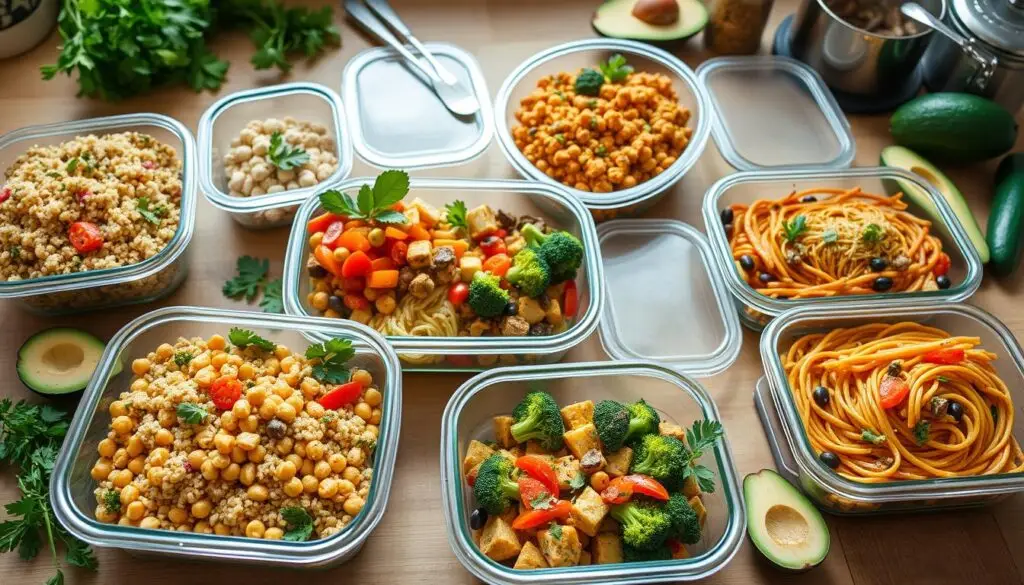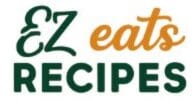As a busy professional, finding time for healthy meals can be tough. But, meatless meal prep might be the answer you need. This guide will help you add tasty, plant-based dishes to your week. You’ll nourish your body and save time.

Table of Contents
Getting Started with Meatless Meal Prep Essentials
Starting a meatless meal prep journey needs some basic tools, pantry items, and smart storage. With the right equipment and ingredients, you can make meal prep easier. This helps you smoothly transition to a plant-based diet.
Essential Kitchen Tools and Equipment
Here are some kitchen tools to make meatless meal prep simpler:
- A high-powered blender or food processor for smoothies, dips, and nut butters
- Sharp knives and a sturdy cutting board for chopping veggies
- Measuring cups and spoons for accurate ingredient portions
- A slow cooker or Instant Pot for easy meal prep
- Baking sheets and pans for roasting and baking
Basic Pantry Ingredients for Plant-Based Cooking
Keep these plant-based staples in your pantry for quick meal prep:
- Whole grains like quinoa, brown rice, and oats
- Legumes such as lentils, chickpeas, and black beans
- Nuts and seeds like almonds, walnuts, chia, and flaxseeds
- Spices and herbs like cumin, paprika, garlic powder, and dried oregano
- Healthy oils like olive, avocado, and coconut oil
- Canned or jarred tomatoes, diced or crushed
Storage Containers and Organization Tips
Good food storage is crucial for meatless meal prep. Get a variety of airtight containers, including:
- Glass or BPA-free plastic meal prep containers with compartments
- Reusable silicone bags for storing ingredients
- Mason jars for sauces, dips, and overnight oats
Organizing your meal prep area helps too. Set aside a part of your pantry or fridge for prepped items. Label your containers for easy finding. Always use the oldest items first to avoid waste.
Benefits of Plant-Based Meal Planning
Choosing plant-based meals brings many health benefits. It helps with weight loss and increases fiber intake. It also gives you access to lots of vegetarian protein sources.
By adding more fruits, veggies, whole grains, and legumes to your meals, you improve your health. This can make you feel better overall.
Meal planning helps with weight management. It lets you control how much you eat and balance your nutrients. It also saves time and money by cutting down on grocery trips and food waste.
Creating a meal plan that focuses on veggies, whole grains, and protein is easy. You can make it fit your tastes and health goals. Studies show that plant-based diets lower the risk of heart disease, diabetes, and some cancers.
- Meal planning helps you eat healthy by balancing your diet. It ensures you get all the nutrients you need.
- Vegan meal prep can be full of protein. It includes legumes, whole grains, nuts, seeds, and lots of fruits and veggies.
- Eating more fruits and veggies can save money. Buying in bulk and planning meals can cut down expenses even more.
Choosing a plant-based lifestyle is good for your health and the planet. Plant-based foods need less water and land. They also produce fewer greenhouse gases than animal products.
“Meal planning is a powerful practice that enhances health and time management, aiding in achieving dietary goals such as weight-loss management, adherence to specific diets like vegan or keto, and promoting healthy meal prep habits.”
Smart Shopping Guide for Vegetarian Ingredients
Living a vegetarian lifestyle doesn’t have to be expensive. With smart shopping, you can find healthy, affordable ingredients for your meals. Let’s look at some ways to save money at the grocery store and keep your diet both healthy and affordable.
Seasonal Produce Selection
Choosing seasonal and local fruits and vegetables can save you money. These items are often cheaper because they’re more common. They’re also fresher and full of nutrients. Try different vegetables each season to keep your meals exciting and your budget balanced.
Protein Sources for Vegetarians
Many think vegetarian protein is expensive, but it doesn’t have to be. Legumes like lentils and chickpeas are great and affordable. Nuts, seeds, and whole grains are also good sources of protein that won’t cost a lot.
Budget-Friendly Shopping Tips
Here are some budget-friendly shopping tips for the grocery store:
- Look for fresh, whole foods like fruits, vegetables, and grains along the store’s edges.
- Choose dry goods like beans, lentils, and oats instead of canned items for better value.
- Use bulk bins for items like rice, quinoa, and nuts to save money.
- Watch for sales, discounts, and generic brands to save more.
- Plan your meals and make a list to avoid buying things you don’t need and reduce waste.
By choosing seasonal produce, focusing on plant-based proteins, and using smart shopping strategies, you can enjoy a tasty and healthy vegetarian diet without spending too much.
Quick and Easy Breakfast Meal Prep Ideas
Busy mornings can be tough, but meal prep makes breakfasts easy and healthy. Try overnight oats or savory breakfast burritos for a quick start. These ideas will make your mornings easier.
Overnight Oats
Overnight oats are a top choice for meal preppers. Start with 1/2 cup old-fashioned oats, 1/2 cup milk, and 1/4 cup Greek yogurt. Add your favorite flavors like peanut butter or berries. Let it sit in the fridge overnight for a quick breakfast.
Breakfast Burritos and Sandwiches
Make a batch of healthy breakfast burritos or sandwiches on the weekend. Scramble eggs with veggies, cheese, and protein. Wrap them in whole-wheat tortillas or English muffins. These can be frozen for up to 3 months, perfect for busy mornings.
Muffins, Scones, and Pastries
Bake muffins, scones, or quick breads on the weekend. Try recipes like Whole Wheat Pumpkin Muffins or Banana Protein Muffins. They’re full of fiber and protein to keep you full. Freeze them for a quick breakfast pastry.

With a bit of planning, you can enjoy many healthy breakfasts all week. Start your busy mornings with these easy meal prep ideas.
Meatless Meal Prep Strategies for Success
Meal prep is a smart and tasty way to follow a plant-based diet. It uses quick preparation and batch cooking to make meatless meals easy and safe all week.
Time-Saving Preparation Techniques
Begin by chopping all your veggies ahead of time. This one step can cut down your meal prep time a lot. Also, cook grains like quinoa or brown rice in big batches. This way, they’re ready for different meals.
Batch Cooking Methods
Batch cooking is a great way to be efficient. Make big batches of plant-based proteins, like roasted chickpeas or lentil stew. Then, portion them out for easy meals all week. This keeps you healthy and on track.
Food Safety Guidelines
Keeping your meals safe is key. Use good storage containers and label them well. When you reheat, make sure it’s hot enough to kill off bad bacteria.
With these tips, you’ll save time, feel less stressed, and enjoy tasty plant-based meals all week.
Protein-Rich Vegetarian Lunch Options
Creating healthy vegetarian lunches is easy. Focus on protein-rich plants for tasty, filling meals. You can make delicious salads and sandwiches that keep you going all day.
Protein-Boosting Salads
Salads are great for adding protein with lentils, chickpeas, and tofu. Try a Lentil and Roasted Vegetable Salad or a Chickpea and Quinoa Power Bowl. These lunches are packed with nutrients and energy.
Satisfying Sandwiches and Wraps
Use tempeh, baked tofu, and nut butters for protein in sandwiches. Make a Tempeh Reuben or a Tofu Banh Mi. These are tasty, protein-rich options for lunch.
Meal Prep-Friendly Options
Batch-cooking protein-rich dishes makes meal prep easy. Try Baked Enchilada Beans, Lentil Bowls, and Vegan Burrito Bowls. These can be made ahead and enjoyed all week.
| Vegetarian Lunch Idea | Protein Content |
|---|---|
| Lentil and Roasted Vegetable Salad | 15 grams per serving |
| Chickpea and Quinoa Power Bowl | 18 grams per serving |
| Tempeh Reuben Sandwich | 20 grams per serving |
| Tofu Banh Mi | 16 grams per serving |
Adding these protein-rich vegetarian lunches to your meal prep is a smart choice. You’ll enjoy tasty, healthy meals all week long.

Freezer-Friendly Vegetarian Dinners
Busy families can enjoy meatless meals all week with freezer-friendly options. There are many plant-based recipes that freeze well. These include hearty casseroles, pasta dishes, soups, and stews.
Casserole and Pasta Dishes
Vegetarian lasagna, baked ziti, and stuffed peppers are great for freezing. Assemble the casserole, cool it, then portion and package. When you’re ready, thaw it in the fridge overnight and bake as instructed.
For pasta dishes, make extra veggie sauces to freeze with cooked noodles.
Soups and Stews
Freeze soups and stews in individual portions for quick reheating. Options like vegetarian chili, lentil stew, and minestrone freeze well. Make sure to leave space in the containers for expansion.
Veggie-Packed Main Courses
Enjoy main dishes full of veggies from your freezer. Try quinoa patties, stuffed sweet potatoes, and veggie pot pie. Prepare these meals ahead, then freeze for later. Thaw and reheat in the oven or microwave.
With a freezer full of meatless meals, you’re set for healthy dinners all week. Embrace the ease of vegetarian casseroles, plant-based soups, and veggie-packed dinners. They make meal planning simple and support your busy life.
Make-Ahead Snacks and Sides
Boost your meatless meals with tasty and healthy vegetarian snacks and sides. Make energy-boosting vegetarian snacks like homemade granola bars or protein-rich trail mix for busy days. Roast healthy sides like seasoned sweet potato wedges or Brussels sprouts for the week.
For easy meal prep snack ideas, make a big batch of creamy hummus or vibrant pesto. Enjoy them with fresh veggies and whole-grain crackers. Overnight oats with chia seeds, berries, and nuts are a great breakfast. They’re nutritious and easy to take on the go.
Spending a little time on the weekend to prep these vegetarian snacks and healthy sides is worth it. You’ll have many tasty, plant-based options for your meatless meals. This makes your week easier and keeps you full of energy.
FAQ
What are the essential kitchen tools and equipment for meatless meal prep?
You’ll need a food processor, blender, and storage containers for meatless meal prep. These help organize and prepare your meals.
What are the basic pantry ingredients for plant-based cooking?
For plant-based cooking, stock up on whole grains, legumes, nuts, seeds, and spices. Don’t forget fresh fruits and vegetables too.
What are the benefits of plant-based meal planning?
Plant-based meal planning boosts fiber intake and may help with weight loss. It also lowers the risk of type 2 diabetes and heart disease.
How can I shop for vegetarian ingredients on a budget?
To shop for vegetarian ingredients on a budget, choose seasonal produce. Look in both the store’s perimeter and inner aisles. Focus on affordable proteins like legumes, nuts, and seeds.
What are some quick and easy breakfast meal prep ideas?
Quick breakfast ideas include overnight oats, muffins, scones, and breakfast burritos. They’re perfect for busy mornings.
What are some time-saving techniques for meatless meal prep?
Save time by preparing ingredients ahead, like chopping veggies and cooking grains. Batch cooking is another efficient method.
What are some protein-rich vegetarian lunch options for meal prep?
For lunch, try salads, sandwiches, and wraps with tofu, beans, and quinoa. These are packed with protein.
What are some freezer-friendly vegetarian dinner options?
Freeze casseroles, pasta dishes, soups, and stews like vegetarian chili, stuffed peppers, and quinoa patties. They’re great for later.
What are some make-ahead snacks and sides to complement meatless meals?
Prepare energy balls, roasted veggies, and dips ahead of time. They’re perfect for snacking alongside your meatless meals.

